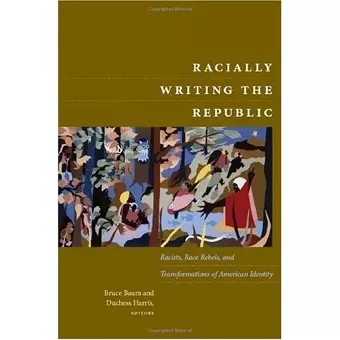Racially Writing the Republic
Racists, Race Rebels, and Transformations of American Identity
Bruce Baum editor Duchess Harris editor
Format:Hardback
Publisher:Duke University Press
Published:29th Jul '09
Currently unavailable, and unfortunately no date known when it will be back

The debasing role of race in constructions and transformations of what it has meant to be American
Investigates the central role of race in the construction and transformation of American national identity from the Revolutionary War era to the height of the civil rights movement. This title highlights the assumptions of white (and often male) supremacy underlying the thought and actions of major US political and social leaders.Racially Writing the Republic investigates the central role of race in the construction and transformation of American national identity from the Revolutionary War era to the height of the civil rights movement. Drawing on political theory, American studies, critical race theory, and gender studies, the contributors to this collection highlight the assumptions of white (and often male) supremacy underlying the thought and actions of major U.S. political and social leaders. At the same time, they examine how nonwhite writers and activists have struggled against racism and for the full realization of America’s political ideals. The essays are arranged chronologically by subject, and, with one exception, each essay is focused on a single figure, from George Washington to James Baldwin.
The contributors analyze Thomas Jefferson’s legacy in light of his sexual relationship with his slave, Sally Hemings; the way that Samuel Gompers, the first president of the American Federation of Labor, rallied his organization against Chinese immigrant workers; and the eugenicist origins of the early-twentieth-century birth-control movement led by Margaret Sanger. They draw attention to the writing of Sarah Winnemucca, a Northern Piute and one of the first published Native American authors; the anti-lynching activist Ida B. Wells-Barnett; the Filipino American writer Carlos Bulosan; and the playwright Lorraine Hansberry, who linked civil rights struggles in the United States to anticolonial efforts abroad. Other figures considered include Alexis de Tocqueville and his traveling companion Gustave de Beaumont, Juan Nepomuceno Cortina (who fought against Anglo American expansion in what is now Texas), Abraham Lincoln, Theodore Roosevelt, and W. E. B. Du Bois. In the afterword, George Lipsitz reflects on U.S. racial politics since 1965.
Contributors. Bruce Baum, Cari M. Carpenter, Gary Gerstle, Duchess Harris, Catherine A. Holland, Allan Punzalan Isaac, Laura Janara, Ben Keppel, George Lipsitz, Gwendolyn Mink, Joel Olson, Dorothy Roberts, Patricia A. Schechter, John Kuo Wei Tchen, Jerry Thompson
“I have no hesitation in wholeheartedly recommending this wide-ranging
analysis of the ‘racial writing’ of America to scholars and students within American Studies, Political Science, History, Race and Ethnicity and Sociology. I believe it is a welcome and significant addition to a growing body of literature on the critical analysis of racial formations.” - Rachel L. Finn, Ethnic and Racial Studies
“In bringing together in one volume new readings of classical political
theory and explorations of protest thought historically excluded from the canon, this book will serve multiple readerships. . . . The book is a bold attempt to move the academic center to the left and disrupt the traditional
ways we have come to conceive of both American studies and political thought.”
- Shani Mott, Journal of American History
“[A]ll fourteen essays in Racially Writing the Republic are boldly written, insightful, and thought provoking. . . . The history of the American republic, as racially written, ignores much of the multiracial contributions of non-Europeans. It also reconstructs an American identity through white hierarchical lens where meritocracy and equality of opportunity are uncontested. Racially Writing the Republic reminds us of America’s shortcomings, if not the failure, of such an identity.” - James D. Ward, Journal of American Ethnic History
“In asking how U.S. commitments to liberty and white supremacy have cohabited, this collection brings to bear state-of-the-art scholarship and a long historical view. Moreover, rather than only focusing on the white/African American color line, it shows that critically important variations have mattered where American Indians, Asian Americans, Latina/os, and ‘white ethnics’ are concerned.”—David Roediger, author of How Race Survived U.S. History: From Settlement and Slavery to the Obama Phenomenon
“[A]ll fourteen essays in Racially Writing the Republic are boldly written, insightful, and thought provoking. . . . The history of the American republic, as racially written, ignores much of the multiracial contributions of non-Europeans. It also reconstructs an American identity through white hierarchical lens where meritocracy and equality of opportunity are uncontested. Racially Writing the Republic reminds us of America’s shortcomings, if not the failure, of such an identity.” -- James D. Ward * Journal of American Ethnic History *
“I have no hesitation in wholeheartedly recommending this wide-ranging analysis of the ‘racial writing’ of America to scholars and students within American Studies, Political Science, History, Race and Ethnicity and Sociology. I believe it is a welcome and significant addition to a growing body of literature on the critical analysis of racial formations.” -- Rachel L. Finn * Ethnic and Racial Studies *
“In bringing together in one volume new readings of classical political theory and explorations of protest thought historically excluded from the canon, this book will serve multiple readerships. . . . The book is a bold attempt to move the academic center to the left and disrupt the traditional ways we have come to conceive of both American studies and political thought.” -- Shani Mott * Journal of American History *
ISBN: 9780822344353
Dimensions: unknown
Weight: 621g
344 pages